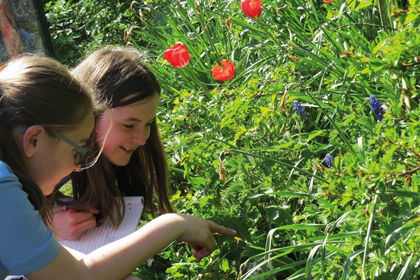Primary Times - the definitive what’s on and where to go family guide of activities and events for children of primary school age. Things to do with your kids during the school holidays including arts and craft activities, music and theatre for children, parties, competitions, days out, and family attractions along with term time drama schools, dance classes, after school clubs and sports activities. Things to do at a place near you!
Families and schools needed to protect our pollinators
 Imagine living in a desert with barely any food, hardly any water or any place to shelter. Unfortunately, this is exactly what it is like for the pollinating insects currently living in the UK.
Imagine living in a desert with barely any food, hardly any water or any place to shelter. Unfortunately, this is exactly what it is like for the pollinating insects currently living in the UK.
Whilst there are around 1,500 species of pollinating insects in Britain, (including bumblebees, butterflies, moths, beetles, hoverflies and various others), these pollinators are in great danger.
Loss of habitats, pesticides, intensive farming practices and the results of a changing climate have left these important insects hungry and homeless, suffering from a lack of food and shelter habitat. Without these pollinating insects visiting flowers, there would be no strawberries, apples, avocados, chocolate, cherries, carrots, grapes, pumpkins, pears, plums or peanuts. In fact, one out of every three mouthfuls of our food depends on pollination taking place. Which is why the Polli:Nation project needs your help.
Polli:Nation is a Heritage Lottery Funded project that enables children, families and communities to learn about the importance of pollinating insects, as well as create habitats and food sources to help them to survive.
The Polli:Nation project is looking for families and schools across the UK to take part in a survey to aid research on the health and status of pollinating insects in their own areas. Now in its second year, the project is being led by the charity, Learning through Landscapes, with help from several expert partners including OPAL, Butterfly Conservation, Bumblebee Conservation Trust, Field Studies Council, Buglife, TCV and Stirling University.
How you can help
Survey your space!
Whether you are a family, an individual, a school or even a community group, participating in the Polli:Nation survey is fun and easy, and your findings will help scientists to develop an accurate understanding of the current state of the habitats for Britain’s pollinating insects.
The first stage of the pollination survey requires participants to record which habitats and flowers are found in a 10x10m survey site. The Polli:Nation survey pack has all the resources you’ll need to do this and can be downloaded at www.polli-nation.co.uk/activity/survey/.
This contains the survey booklet, habitat, plant and pollinator identification guide, recording sheets and group leader support guide- (if needed). Using these resources, you can survey the type of habitats in your site, and you don’t need to be a plant expert to do this. Simply recording any information such as the ground type, grass length or flowers in the area, will all help.
The second half of the survey is based on the observation of a 1m x 1m quadrat for just two minutes. Here you will spot and record the different types of insects that visit in that time. Again, you don’t need to be an expert, as the downloadable guides will help you identify all of the different species.
The survey can be completed in under an hour (up until September) and can be undertaken in any outdoor space such as a garden, school grounds, or even a local park and has been designed for people of all ages, backgrounds and levels of experience. Once you survey your space, the results can be submitted either online or by post.
Create habitats
In order to thrive, pollinators need a range of different nesting, feeding and shelter habitats as well as various different food sources in the form of nectar and pollen from flowers. The Polli:Nation project encourages these, providing various activities and information about what you can do in your own home or school grounds to improve habitats and food sources. It doesn’t matter whether you’re a family with a paved garden, or if your school only has a small asphalt space, there are lots of ideas on the Polli:Nation website to help you make your area more pollinator friendly.
For example, if you have bare fences or walls, you can easily make them homes for solitary bees such as the Red Mason bee or the Leaf-cutter bee. This can be done by creating bee hotels by simply collecting 6-8inch lengths of bamboo cane (or native hollow stem), tying them into a bundle and hanging them in a sunny, south facing position.
Or, if you want to get your school involved but you only have a single field in your grounds- you could leave a small patch of the grass unmown and then wait to see what appears. Often there are plenty of wildflowers already growing all around us, but we never notice them as they are mown before they have the chance to flower.
You’ll also be surprised how many ways this project complements the lessons children are already learning in school- whether it’s drawing scale plans of your area as a part of a maths project, learning about pollinators for science, or undertaking a pollinator-themed art project- Polli:Nation is a fun educational experience. And, if your school has an ‘eco’ or gardening club then growing plants for pollinators could also be a great theme.
The more people that take part, the better our understanding of the pollinator species in Britain will be. So get out there now, become a citizen scientist and help the pollinators in your community!
For all the information you need go to www.polli-nation.co.uk



